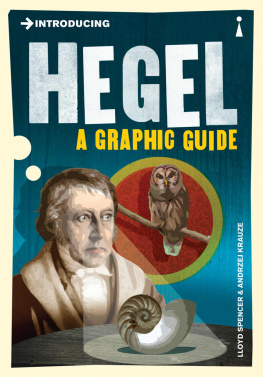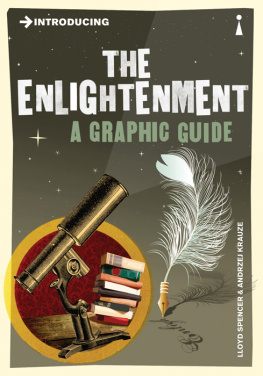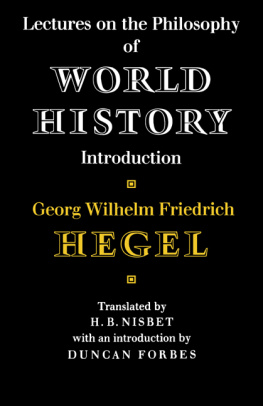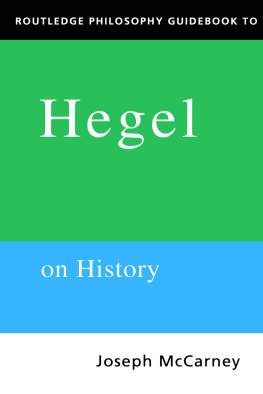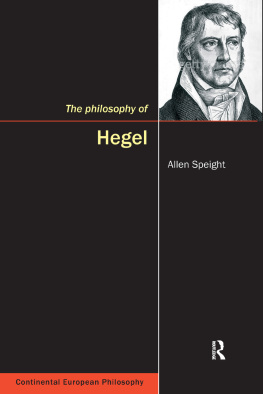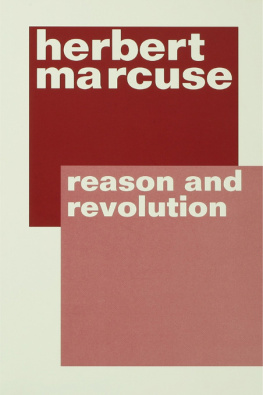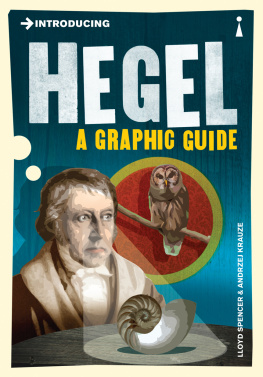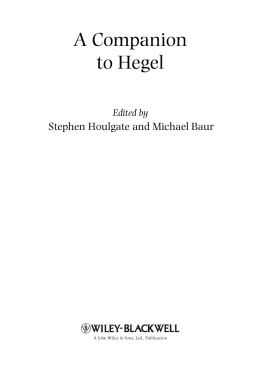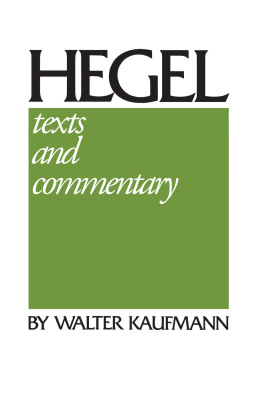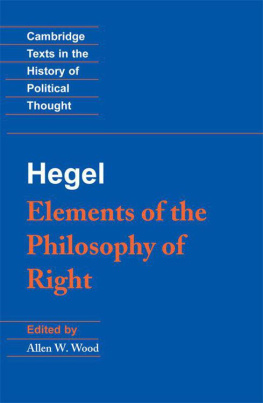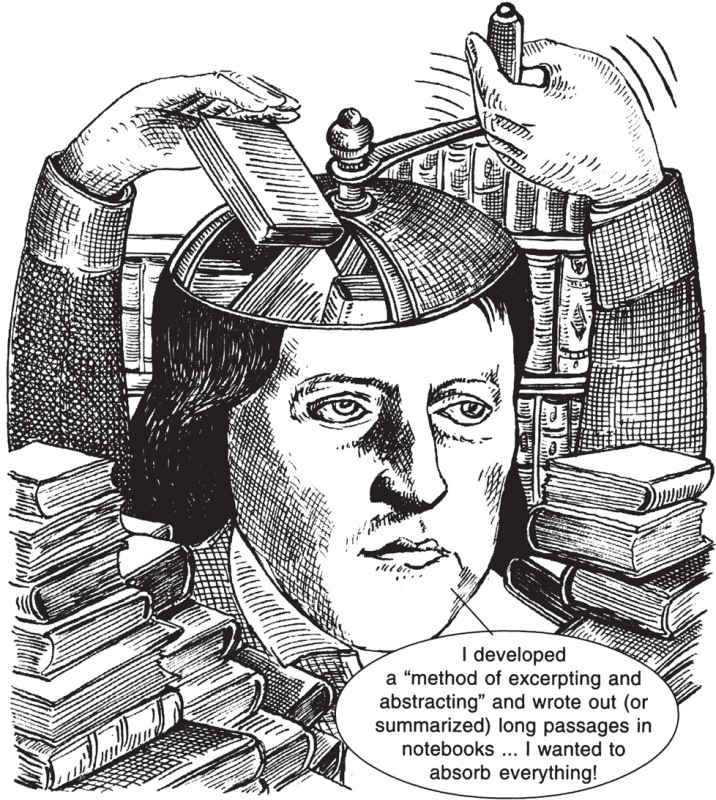Published by Icon Books Ltd, Omnibus Business Centre, 3941 North Road, London N7 9DP
Email:
www.introducingbooks.com
ISBN: 978-184831-979-0
Text copyright 2012 Icon Books Ltd
Illustrations copyright 2012 Icon Books Ltd
The author and illustrator has asserted their moral rights
Originating editor: Richard Appignanesi
No part of this book may be reproduced in any form, or by any means, without prior permission in writing from the publisher.
Contents
Hegel is a philosopher of awe-inspiring, monumental ambition. His philosophy aims to incorporate the history of all previous philosophies. He conceives of this entire history as a process of completion, as all of existence, indeed the cosmos itself, evolves to full self-consciousness.
There is no room in Hegels philosophy for a God outside or beyond the universe. His system presents itself not only as the self-consciousness of the cosmos, as Absolute Knowledge, but at the same time as an expression of the thoughts of God.
I believe that in the course of my own development as a philosopher, I have recapitulated and given expression to the autobiography of the Absolute.
The Life
On 27 August 1770, Georg Wilhelm Friedrich Hegel was born at No. 53 Eberhardstrasse in Stuttgart.
Hegels father, Georg Ludwig, was a minor civil servant at the court of the Duchy of Wrttemberg. This area (Swabia) produced a surprising array of outstanding writers, philosophers and theologians. Hegel kept his broad sing-song Swabian inflection even when teaching at the University of Berlin.
Hegel was the eldest of three children. His younger brother, also named Georg Ludwig, became an army officer, participated in Napoleons Russian campaign and died young.
Hegels mother began his education in Latin before he went to school. She died when Hegel was just 11.
Hegel appears to have kept on good terms with his father, until his student days, when his enthusiasm for the French Revolution opened up a rift between father and son.
Hegels Sister, Christiane
Hegel was very attached to his sister, Christiane. When Hegel set out his ideas on ethics, he did so by referring to Sophocles tragedy Antigone.
Christiane nursed a fierce attachment to her brother. After Hegels marriage (at age 40), Christiane suffered what Hegel would later call hysteria and had to resign from her post as governess. In 1820, she was committed to an asylum, but was released the following year. Troubled by bitterness over alleged wrongs, she gave vent to her jealousy of Hegels young wife.
From it, I drew the lesson that a sisters love for a brother is the highest kind of love there is.
Foreseeing Psychotherapy?
Hegel suggested that therapy had to be dialectical: it had to involve sympathizing with the patients complaints, winning the trust of the disturbed. It would involve respecting the patients rational personality while at the same time overcoming the one-sidedness and abstraction of the patients fixed ideas.
But I also considered having Christiane treated by the French psychiatric reformer Philippe Pinel, whose new ideas had impressed me.
Philippe Pinel (1745-1826) came to prominence during the French Revolution as the liberator of the mad.
Two weeks after Hegels death, Christiane wrote a courteous, formal letter to his widow and included a brief memoir of her brothers childhood in which she portrayed Hegel as a precocious and industrious schoolboy.
Lacked all bodily agility. Must have been easy to get along with, for he always had many friends; loved to jump, but was utterly awkward in dancing lessons.
Within three months of her brothers death, Christiane went out for a walk and drowned herself.
Hegels Education
Hegel gained a thorough grounding in the classics and was fluent in Latin and Greek. The Greek tragedies were his favourite reading matter. He was at home in German literature. His scientific training, too, was good for the times.

My teachers received no salary and were dependent on fees. They attempted to maximize class sizes (even 60 or more) of varying ages and abilities.
This may have been the origin of the belief Hegel later expressed in the necessity of active and independent learning.
The Excerpt Mill
Early on and throughout his life, Hegel recorded everything he studied. Aged fifteen, he began a diary (not of personal matters but of his studies and findings).
I developed a method of excerpting and abstracting and wrote out (or summarized) long passages in notebooks I wanted to absorb everything!
Everything was grist to his excerpt mill philology and literary history, aesthetics, aphorisms and witticisms, experiences and physiognomics, mathematics, physics, psychology, pedagogy and, of course, philosophy. Hegel was already intellectually omnivorous. He wanted to absorb simply everything.
If, as is the case, the majority of quotations in Hegels mature works contain mistakes or are mistakenly attributed, this is because Hegel almost always quotes from memory. The range of material he had internalized is staggering.
Germany in Hegels time was a patchwork of tiny states (such as the Duchy of Wrttemberg where Hegel was born). There were no cities of any size and very little industry. In Prussia, serfdom was abolished, and the Jews emancipated, only after defeat by Napoleon. In 1765, James Hargreaves introduced the Spinning Jenny to England, but at the time of Hegels birth, Germanys industrialization still lay in the future. (The first German railway opened in 1835 four years after Hegels death.)

